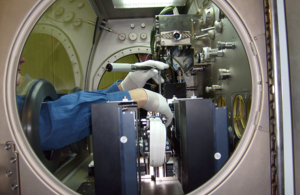UK experiment to create materials for metal and medicine launches
A UK experiment to find new ways of creating materials to be used for medicines and metal alloys launched to the International Space Station (ISS).

Hands working on Particle Vibration experiment
A UK experiment to find new ways of creating materials that could be used to produce medicines and metal alloys started its journey to the International Space Station (ISS).
The Particle Vibration experiment, led by the University of Strathclyde and built by UK-firm QinetiQ, took off from the Kennedy Space Center in Florida on-board a SpaceX Falcon 9 rocket at 19:20 UTC on 26 November 2022.
Science Minister George Freeman said:
This experiment paves the way for exciting scientific discoveries that could transform methods of manufacturing, demonstrating just how valuable a resource space can be for growth and industry in the UK and around the world.
The organisations behind the experiment, QinetiQ and University of Strathclyde, provide two examples of the diversity of expertise across the UK space sector, which is already worth £16.5 billion to our economy. I look forward to seeing the next steps for this innovative work.
Astronauts on the ISS will use the equipment in an experiment that involves heating and shaking complex fluids – liquids that contain fine solid particles or other liquid droplets – in space’s microgravity environment to create new materials. This cannot be achieved on Earth, as the planet’s gravity tends to separate complex fluids into their individual components, according to their weight.
This results in a concentrated layer of particles on the bottom or on the top of the container, which would then prevent the production of these materials with the desired properties.
This method, using precise vibrations to allow contact-less control of dispersed particles, could lead to improved or completely new, types of metal alloys, non-metallic conductors, plastics, and “macromolecular” substances that can be used to produce medicines, such as protein crystals for use in vaccine delivery. The fluid flow produced by vibrations could also be used to define new methods to effectively cool nuclear reactors and electronics.
The UK Space Agency provided £1.6 million funding for the build of the Particle Vibration experiment, which will be launched and operated by the European Space Agency (ESA) Human and Robotic Exploration programme through UK membership of the agency.
Libby Jackson, Head of Space Exploration at the UK Space Agency, said:
Particle Vibration shows how investing in space exploration, and the research in space that it enables, can benefit us here on Earth.
In-space manufacturing harnesses the benefits of the space environment to create materials that are of much higher quality that those we can create on Earth, and that can be used to improve production of all sorts of materials crucial to our health and growth.
The third in a series of experiments on the ISS that have been built with UK Space Agency funds, Particle Vibration showcases two UK organisations that are breaking new ground in space science and technology.
Dr Marcello Lappa, leading the project at the University of Strathclyde, said:
With these experiments we will investigate how, by shaking a fluid-solid-particle mixture in microgravity, we can create materials with structures that we cannot make on Earth.
It will lead to new advanced techniques and nanotechnologies for the production in space of advanced materials and alloys with properties that can only be obtained in space.
Minister for Scotland John Lamont said:
This is hugely exciting research, with the potential to deliver transformational changes to the daily lives of people all around the world. It’s fantastic that this is being led by a team based in Scotland, with UK Government support, and another excellent example of the way in which Scotland is playing a key role in the UK’s thriving space sector industries: from building and launching satellites, to developing truly innovative technologies.
Particle Vibration is the third experiment funded directly by the UK Space Agency to fly to the ISS. The first, called Molecular Muscle 2, launched in June 2021 and saw scientists from Nottingham and Exeter University send thousands of tiny worms to live on board the space station for several days to help understand spaceflight-induced muscle decline.
The second, called MicroAge, launched in December 2021, with scientists from the University of Liverpool, sending tiny human muscle cells, the size of a grain of rice, into space to understand what happens to human muscles as we age, and why.
For more information about this or other UK Space Agency missions and programmes, please contact francesca.gosling@ukspaceagency.gov.uk.